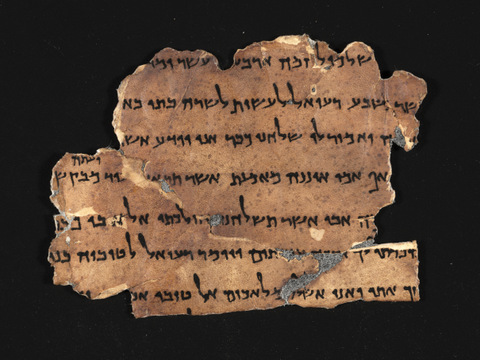
The Tobit scroll, one of the books of the Apocrypha, from second temple times. Photograpic Credit: Shai Halevi, Courtesy of the Israel Antiquities Authority
The Dead Sea Scrolls – Version 2.0:
The Israel Antiquities Authority is launching today an upgraded version of its Leon Levy Dead Sea Scrolls Digital Library. It includes 10,000 new photographs of unprecedented quality
A second, upgraded version of the Leon Levy Dead Sea Scrolls Digital Library was launched today. Visitors to the new website (www.deadseascrolls.org.il) will be able to view and explore 10,000 newly uploaded images of unprecedented quality. The website also offers accompanying explanations pertaining to a variety of manuscripts, such as the book of Exodus written in paleo-Hebrew script, the books of Samuel, the Temple Scroll, Songs of Shabbat Sacrifice, and New Jerusalem.
A year has passed since the Israel Antiquities Authority first launched the Leon Levy Dead Sea Scrolls Digital Library. The library presents hundreds of scroll fragments imaged in unprecedented quality, achieved with a unique camera developed specifically for this purpose and installed at the Israel Antiquities Authority scrolls conservation laboratory in Jerusalem. Over half a million people worldwide have visited the site; 25,000 new users enter the site every month. Dead Sea Scrolls scholars as well as the general public will now be able to view, explore and examine one of the greatest archeological discoveries of the 20th century on their personal computers and even on their cellular phones.
The upgraded website comprises many improvements: 10,000 new multispectral images, improved metadata, additional manuscript descriptions, content pages translated into Russian and German in addition to the current languages, a faster search engine, easy access from the site to the facebook page and to twitter and more.
Through international collaboration, a unique monitoring system for the conservation of the scrolls was developed, using the multispectral images. The monitoring system will ensure the scrolls are properly preserved and kept in optimal conditions that simulate those in the Judean Desert caves, where the scrolls survived for over 2,000 years. The system will be installed in the Dead Sea Scrolls conservation laboratory over the next few months. Using this advanced technology for long-term monitoring of the scrolls will help resolve scientific challenges in preserving these ancient scrolls.
The Israel Antiquities Authority is currently advancing local and international collaborations to add to the digital library transcriptions and translations of the scroll texts. The next versions of the website will also include additional images, tools for scholars, conservation data, content pages in additional languages, as well as advanced and multiple search options.
Additional Articles ...